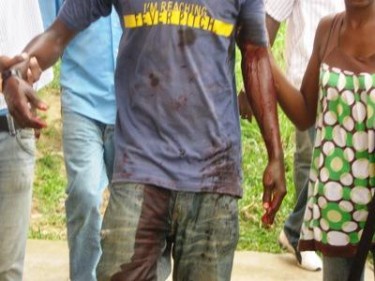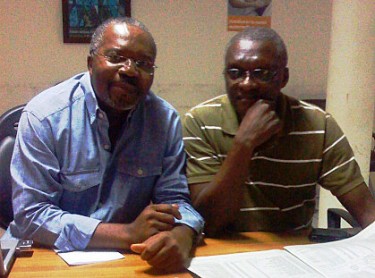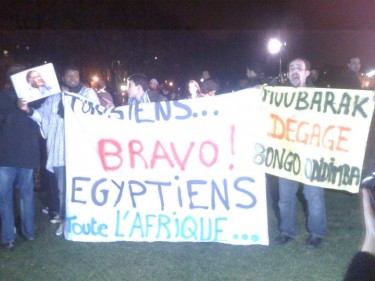This post is part of our special coverage of Gabon Unrest 2011.
Gabon is entering its third week of political tension, as its two governments – official and unofficial – both claim the presidency. But as developments continue in this small West African nation, critics denounce a lack of leadership in the burgeoning opposition movement.
Ongoing Repressions
Ida Reteno Assonouet, Minister of Justice of the official Gabonese Government announced in a press release on 12 February, 2011, that a warrant had been issued [fr] for the arrest of opposition leader André Mba Obame, self-proclaimed ‘unofficial’ President of Gabon and the government he has formed.
The same Minister announced that sympathisers who were demonstrating in front of the United Nations Development Programme (UNDP) building where the opposition government are in hiding, would also be arrested.
In addition, Camarade on Le Post Blog [fr] posted an article regarding students demonstrations at University Omar Bongo, explaining that police are arresting protestors within the campus, in a bid to stifle the movement that started there on Thursday 10 February, 2011.

Student wounded at the University Omar Bongo in Gabonese capital Libreville. Image by Camarade on Le Post.
Among the repressive measures being taken by the official regime, one caused particular discussion among users of the Twitter microblogging network: satirical African online newspaper Le Gri-Gri International has reported [fr] that Guy-Blaise Nambo-Wezet, Gabonese Ambassador to Switzerland, was recalled to Libreville:
Guy-Blaise Nambo-Wezet, ambassadeur du Gabon en Suisse qui a été convoqué par les services de renseignements de l’armée, le tristement célèbre B2
B2, the second bureau of the army intelligence services, has a reputation for questioning and torture. Le Gri-Gri continues:
l’intéressé est le frère cadet du Professeur Joseph John-Nambo, Ministre de l’Intérieur dans le gouvernement légitime du Président Mba Obame
This connection to the ‘unofficial’ opposition government, led Le Gri-Gri to question the political motivation behind this move:
contre tous les usages diplomatiques, un ambassadeur est rappelé, non pas par son ministre de tutelle, « pour consultation », mais par un service de l’armée pour y être entendu comme un vulgaire délinquant.
Meanwhile at the UNDP building in Libreville, Mba Obame and his ‘ministers’ continue to work in forced asylum, as this Le Gri-Gri International photo story [fr] shows:

Michel Ongoundou Loundah, 'unofficial' Gabonese Minister of Defense and Joseph John-Nambo, 'unofficial' Minister of Interior. Image from Le Gri-Gri International.
Gabonese Diaspora in Action
To help understand the struggle against Ali Bongo's regime, three leaders of the international Gabonese diaspora agreed to be interviewed on the issue, and their own reflections on the current crisis.
Gloria Mika is an activist and founder of the citizen watch initiative Les anges gardiens du Gabon [fr] (Gabon's Guardian Angels for Transparency); Jean-Aimée Mouketou, is a Geography professor in Versailles, France and fellow professor in New-Scotland, Canada, who represents DIAGAU (Diaspora Gabonaise Unie – United Gabonese Diaspora) in France; Joël Mbiamany N'tchoreret is a professor in educational psychology in Canada and blogger, who is involved in Gabonese political groups abroad.
Referring to demonstrations organised by Gabonese citizens living in France, Gloria Mika says:
Les gabonnais de l’étranger n’ont pas manqué d’exprimer leur intérêt, en France et aux USA principalement.

Gabonese demonstrating in Paris on 11 February, 2011, in support of the Egyptian protests. Image by Gloria Mika on Facebook.
For Joël Mbiamany N'tchoreret, mobilisation is a little more difficult in Canada:
Jusqu’à maintenant, il n’y a pas encore eu des actions concrètes directes sur le terrain. Il faut dire que la population gabonaise au Canada est composée majoritairement d’étudiants (80%). La plupart sont des enfants du système comme on dit.
Beyond the political crisis, there appears a profound division between the political elite and the people who are organising to demonstrate. All of the interviewees agree that Ali Bongo won the 2009 presidential election fraudulently, and they all agree on the point that the opposition movement needs a leader.
For Jean-Aimée Mouketou the problem lies in the credibility of those opponents pretending to bring about change:
Au sortir des élections présidentielles d’Août 2009, le peuple gabonais est allé voter massivement pour l’opposition gabonaise et au sortir de cette même élection le même peuple gabonais est sorti massivement pour protéger/revendiquer cette élection, malheureusement, ce même peuple a été encore une fois roulé par ces opposants que moi je qualifie de pseudos opposants
Nevertheless Mouketou admits that André Mba Obame's political act is “courageous”.
Mika insists that:
Nous avons la chance d’avoir un mouvement historique, en référence à ce qui s’est passé en Tunisie, On espère aujourd’hui trouver l’élement qui sera un déclic
For Joël Mbiamany, the movement must go beyond mere political figures:
Nous travaillons fortement pour que cette révolte se situe au-delà des leaders et des partis politiques.
One thing is sure for Jean-Aimé Mouketou, the proceedings in Gabon do not have an ethnic aspect:
Ce qui se passe actuellement au Gabon ce n,’est pas une affaire ethnique, mais un problème d’homme politique.
This post is part of our special coverage of Gabon Unrest 2011.







3 comments
How is it that Andre Mba Obame, who came in _third_ in the 2009 Gabonese presidential election, claim to be the actual winner?
I can understand if it was a close race — like Bush and Gore in 2000 in the USA — but Mba Obame only got about 25 percent of the vote. (There were 17 other candidates, as well.) The winner had about 42 percent.
It’s an odd claim that the third-place vote-getter is the winner. That doesn’t even work in horse racing.
Hello,
I would like to inform you and your group about
The First African Diaspora Rally in Washington, DC on Saturday August 20, 2011
Below are some links to the messages about the Rally
Stand up for Africa
http://www.youtube.com/watch?v=JihfniVwrAA
Some feedback
Western Democracy in Africa 1 & 2
http://www.youtube.com/watch?v=-nHnggb4xxM
http://www.youtube.com/watch?v=e_p8FaVic2w
Why Gaddafi must die
http://www.youtube.com/watch?v=zCnFBqVwhw8
Gbagbo’s victory
http://www.youtube.com/watch?v=k1om3lrwPH0